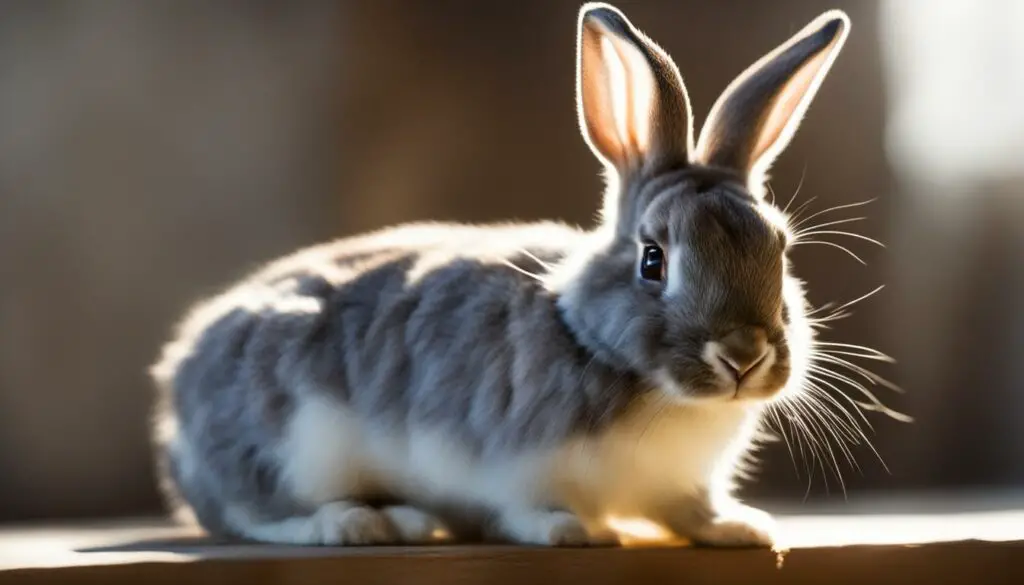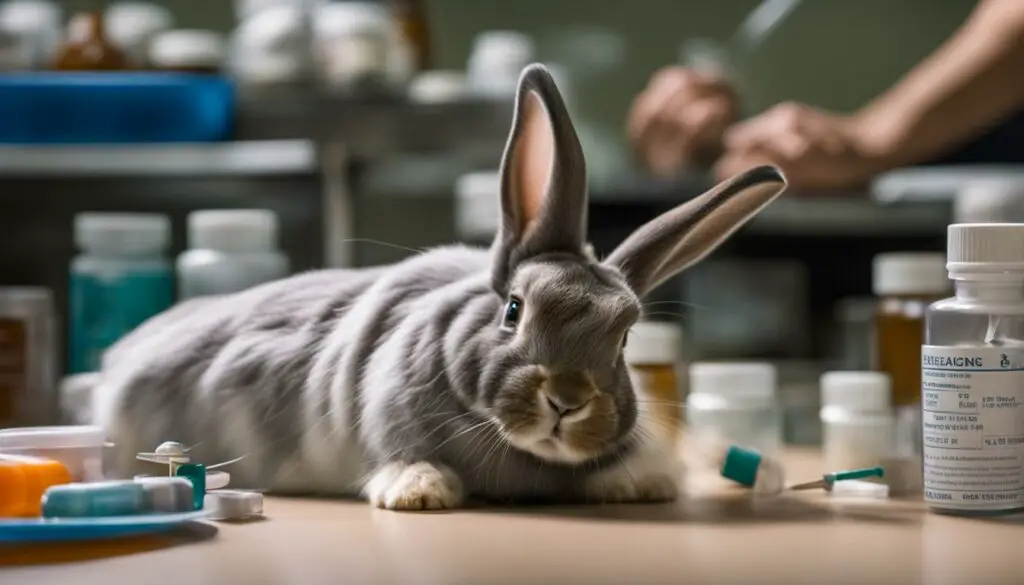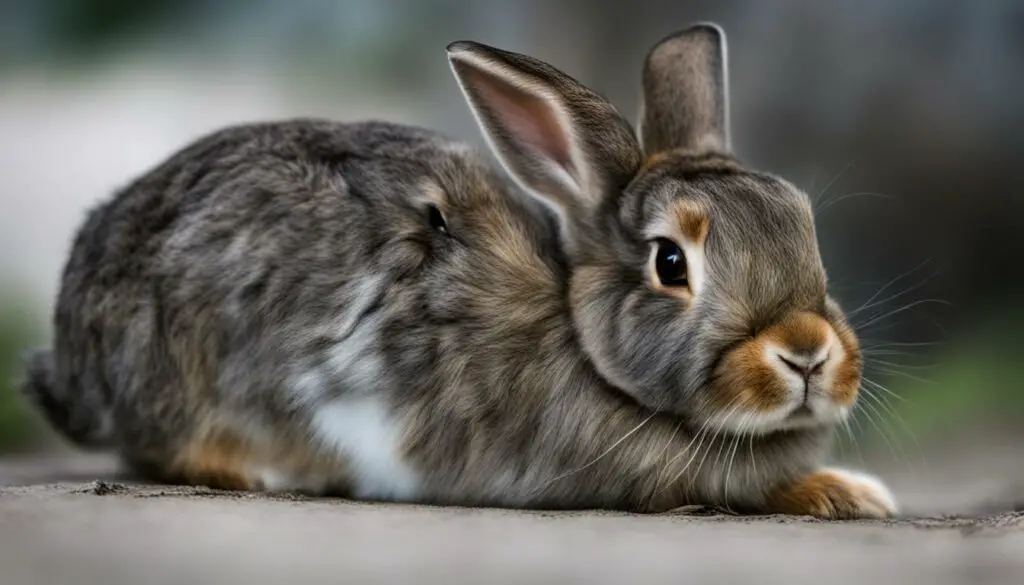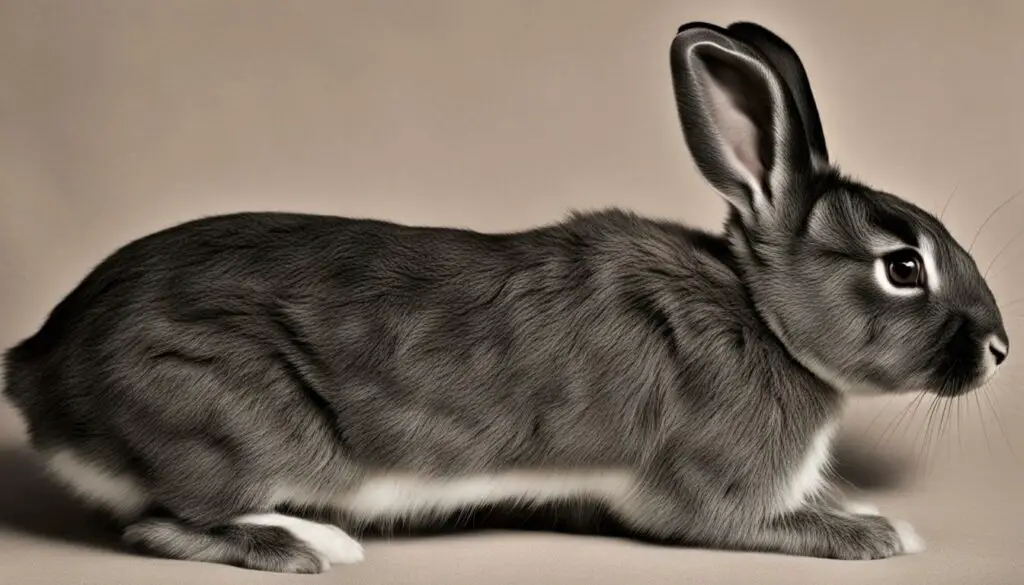As a rabbit owner, it is important to be aware of the potential health issues that can affect your furry friend. One of the most concerning conditions is seizures, especially when they occur before death. Seizures in rabbits are a neurological disorder characterized by uncontrolled muscle contractions and changes in mental status. They can range in severity and may even be fatal.
During a seizure, your rabbit may experience full body tremors, loss of consciousness, and small muscle twitches or tremors. These episodes can be distressing to witness, and it is crucial to seek veterinary attention as seizures can be a medical emergency. Identifying the underlying cause of the seizures is essential for effective treatment and prevention.
Key Takeaways:
- Rabbit seizures before death are a concerning health issue that requires immediate veterinary attention.
- Seizures in rabbits involve uncontrolled muscle contractions and changes in mental status.
- Seizures can vary in severity, from small muscle twitches to full body tremors and loss of consciousness.
- Identifying the underlying cause of the seizures is crucial for appropriate treatment and prevention.
- Regular veterinary check-ups and providing a safe environment can help manage and prevent seizures in rabbits.
What Are Seizures in Rabbits?
Seizures in rabbits are a neurologic condition involving uncontrolled muscle contractions and changes in mental status. These seizures can range in severity and may be accompanied by various symptoms such as muscle twitches, convulsions, loss of balance, loss of consciousness, involuntary urination or bowel movements, leg rigidity or paddling, unusual behavior, rolling, circling, head tilt, vocalization, and chewing at the air. Seizures in pet rabbits are uncommon but can occur depending on the underlying cause.
Seizures can be a cause for concern as they can indicate a serious underlying condition. It is important to observe and document these symptoms to assist with diagnosis by a veterinarian. While seizures in rabbits can be distressing to witness, it is crucial to remain calm and ensure the safety of the rabbit during the episode.
If you suspect that your rabbit is experiencing seizures, it is essential to seek veterinary attention. A veterinarian will be able to conduct a thorough examination, perform diagnostic tests, and determine the underlying cause of the seizures. Identifying the underlying cause is crucial for determining appropriate treatment and managing the condition effectively.

Common Symptoms of Seizures in Rabbits:
- Muscle twitches
- Convulsions
- Loss of balance
- Loss of consciousness
- Involuntary urination or bowel movements
- Leg rigidity or paddling
- Unusual behavior
- Rolling or circling
- Head tilt
- Vocalization
- Chewing at the air
It is important to remember that seizures in rabbits can be caused by various factors, including neurologic disorders, infections, toxins, and metabolic issues. Therefore, it is crucial to seek proper veterinary care to assess the underlying cause and develop an appropriate treatment plan.
The Causes of Seizures in Rabbits
Seizures in rabbits can be caused by a variety of factors, ranging from developmental abnormalities to infectious diseases and neurologic disorders. It is important to identify the underlying cause of seizures in order to determine the most appropriate treatment and management plan for the affected rabbit.
One common cause of seizures in rabbits is epilepsy, a neurologic disorder characterized by recurrent seizures. Other neurologic disorders, such as brain tumors or infections, can also lead to seizures. Additionally, head injuries, trauma, and heat stroke can trigger seizures in rabbits.
Nutritional deficiencies, toxins, and metabolic issues can also contribute to the development of seizures. Rabbits that are exposed to certain toxins, such as pesticides or heavy metals, may experience seizures as a result. Similarly, metabolic imbalances, such as low blood sugar or an electrolyte imbalance, can affect the brain and lead to seizures.
Table: Common Causes of Seizures in Rabbits
| Cause | Description |
|---|---|
| Epilepsy | A neurologic disorder characterized by recurrent seizures |
| Neurologic Disorders | Infections, brain tumors, or other abnormalities affecting the brain |
| Head Injuries and Trauma | Physical injuries to the head that result in brain damage |
| Heat Stroke | Exposure to extreme heat leading to an overheated body and brain |
| Nutritional Deficiencies | Lack of essential nutrients necessary for proper brain function |
| Toxins | Exposure to harmful substances that affect the brain |
| Metabolic Issues | Imbalances in blood sugar, electrolytes, or other metabolic factors |
Identifying the cause of seizures in rabbits is crucial for guiding appropriate treatment and management strategies. If your rabbit experiences seizures, it is important to consult with a veterinarian who can perform a thorough evaluation and recommend the necessary diagnostic tests to determine the underlying cause.
Symptoms of Seizures in Rabbits
Seizures in rabbits can manifest in various ways and understanding the symptoms is essential for recognizing and managing this condition. Some common symptoms of seizures in rabbits include:
- Muscle twitches and tremors
- Convulsions
- Loss of balance
- Loss of consciousness
- Involuntary urination or bowel movements
- Leg rigidity or paddling
- Unusual behavior
- Rolling and circling
- Head tilt
- Vocalization
- Chewing at the air
These symptoms can occur individually or in combination, and the severity and duration of seizures can vary from rabbit to rabbit. It is important to observe and document these symptoms to assist with diagnosis by a veterinarian.
“Seizures in rabbits can manifest in various ways and understanding the symptoms is essential for recognizing and managing this condition.”
| Symptom | Description |
|---|---|
| Muscle twitches and tremors | Small, involuntary muscle contractions |
| Convulsions | Rapid and uncontrolled muscle contractions |
| Loss of balance | Inability to maintain coordination and equilibrium |
| Loss of consciousness | Temporary loss of awareness and responsiveness |
| Involuntary urination or bowel movements | Accidental release of urine or feces |
| Leg rigidity or paddling | Stiffening of the legs or uncontrolled leg movements |
| Unusual behavior | Abnormal actions or reactions not typical for the rabbit |
| Rolling and circling | Rolling over or moving in circles repetitively |
| Head tilt | Inclining of the head to one side |
| Vocalization | Making sounds such as squealing, crying, or whimpering |
| Chewing at the air | Biting and nibbling at nothing or imaginary objects |

How Veterinarians Diagnose Seizures in Rabbits
Diagnosing seizures in rabbits requires a thorough evaluation by a veterinarian. The process typically involves a combination of observation, physical examination, and diagnostic tests. To accurately assess the condition and identify any underlying causes, the veterinarian will rely on various tools and techniques.
Observation and History Taking
During the examination, the veterinarian will carefully observe any seizure episodes that the rabbit experiences. They will note the frequency, duration, and specific symptoms displayed during the seizures. It is crucial for the pet owner to provide a detailed history, including any previous medical conditions, recent changes in behavior or environment, and exposure to potential toxins. This information helps the veterinarian understand the potential triggers or underlying factors contributing to the seizures.
Physical Examination
A comprehensive physical examination is necessary to assess the overall health and neurological status of the rabbit. The veterinarian will check for any abnormalities, such as changes in coordination, muscle tone, or reflexes. They may also examine the rabbit’s eyes, ears, and mouth, as certain conditions or infections can contribute to seizures. Additionally, the veterinarian will evaluate the rabbit’s vital signs, such as heart rate, respiratory rate, and body temperature, to gather further information about the rabbit’s overall health.
Diagnostic Tests
To confirm the diagnosis and identify any underlying causes of the seizures, the veterinarian may recommend specific diagnostic tests. These tests can include routine blood work to assess organ function and detect any infections or metabolic abnormalities. Imaging techniques like MRI or CT scans might be necessary to visualize the brain and identify any structural abnormalities or lesions. In some cases, pathogen-specific blood work may be required to rule out infectious diseases. However, it is important to note that not all cases of seizures will have an identifiable cause, and they may be classified as idiopathic epilepsy.
Diagnosing seizures in rabbits is a complex process that requires careful evaluation and consideration of various factors. By utilizing observation, physical examination, and diagnostic tests, veterinarians can provide an accurate diagnosis and develop appropriate treatment plans to manage the seizures effectively.
| Diagnostic Methods | Description |
|---|---|
| Observation and History Taking | Close observation of seizure episodes and collection of detailed information about the rabbit’s medical history and potential triggers. |
| Physical Examination | A thorough examination of the rabbit’s body, including assessment of neurological status, reflexes, and vital signs. |
| Diagnostic Tests | Various tests such as routine blood work, imaging techniques (MRI or CT scans), and pathogen-specific blood work to identify any underlying causes or structural abnormalities. |
Treatment of Seizures in Rabbits
When it comes to treating seizures in rabbits, the approach will depend on the underlying cause of the seizures. In some cases, the cause may be unknown, and the seizures are classified as idiopathic epilepsy. However, if a specific cause is identified, veterinarians will tailor the treatment accordingly.
Medications are commonly prescribed to manage seizures in rabbits. Phenobarbital, levetiracetam, and potassium bromide are often used to help control seizure activity. These medications work by stabilizing abnormal electrical activity in the brain, reducing the frequency and severity of seizures.
In addition to medication, addressing any underlying conditions or factors that may be contributing to the seizures is crucial. This may involve treating infections, managing metabolic issues, or providing supportive care. Hospitalization may be necessary for rabbits with uncontrolled seizures, where intravenous fluids, anti-seizure medications, and nutritional support can be provided.

It is important to work closely with a veterinarian to determine the most appropriate treatment plan for a rabbit experiencing seizures. Regular veterinary check-ups are essential to monitor the effectiveness of the treatment and make any necessary adjustments. With proper care and management, it is possible to help rabbits with seizures lead happy and fulfilling lives.
Recovery and Management of Seizures in Rabbits
After a seizure episode, it is important to provide a quiet and safe environment for the rabbit to aid in their recovery. Minimizing handling during this time can help prevent any potential injuries. Additionally, monitoring the rabbit closely for any abnormal behavior or symptoms is essential.
Preventing seizures in rabbits can be a challenging task. However, regular veterinary check-ups and providing the best possible care can significantly contribute to keeping rabbits as healthy as possible. It is crucial to address any underlying conditions or diseases that may be causing the seizures.

“Seizures can be a sign of a serious underlying condition, so it is important to seek veterinary attention.”
It is worth noting that seizures in rabbits should always be considered a serious concern and should be evaluated by a veterinarian. The underlying causes and symptoms can vary, which is why proper diagnosis and treatment are crucial for the rabbit’s well-being. By working closely with a veterinarian and following their recommendations, pet owners can aid in managing and preventing seizures in rabbits.
Common Symptoms of a Dying Rabbit
As a rabbit owner, it’s important to be aware of the common symptoms that may indicate your rabbit is nearing the end of its life. Recognizing these signs can help you provide the necessary care and comfort in their final moments. Here are some common symptoms of a dying rabbit:
- Lack of appetite: A dying rabbit may lose interest in eating and have a reduced or complete lack of appetite. This can be a result of their declining health and may lead to rapid deterioration.
- Loss of strength: As a rabbit’s health declines, they may experience a loss of strength and muscle control. This can lead to difficulty moving or maintaining an upright position.
- Erratic movements: Dying rabbits may exhibit unusual and erratic movements, such as dashing in a straight line and falling over. These movements can indicate neurological abnormalities.
- Trouble breathing: Respiratory distress is a common symptom in dying rabbits. They may struggle to breathe, have rapid or shallow breaths, or exhibit labored breathing.
- Abnormal fecal pellets: Changes in the appearance or consistency of fecal pellets can be a sign of a deteriorating condition in a dying rabbit. The pellets may become smaller, softer, or irregular in shape.
- Dramatic changes in behavior: Dying rabbits may exhibit significant changes in behavior, such as becoming withdrawn or unusually aggressive. They may also show signs of depression or appear disoriented.
It’s important to note that these symptoms may vary depending on the cause of death and the individual rabbit’s overall health. If you observe any of these signs in your rabbit, it is advisable to seek veterinary care to ensure your pet’s comfort and well-being in their final moments.

Table: Summary of Common Symptoms of a Dying Rabbit
| Common Symptoms | Description |
|---|---|
| Lack of appetite | A reduced or complete lack of interest in eating |
| Loss of strength | Difficulty moving or maintaining an upright position |
| Erratic movements | Unusual and erratic movements, such as dashing in a straight line and falling over |
| Trouble breathing | Respiratory distress, rapid or shallow breaths, or labored breathing |
| Abnormal fecal pellets | Changes in the appearance or consistency of fecal pellets |
| Dramatic changes in behavior | Significant changes in behavior, such as withdrawal, aggression, or disorientation |
Lack of Appetite in Rabbits
A lack of appetite is a concerning symptom in rabbits and can be an indication of an underlying health issue. When a rabbit refuses to eat for more than 10-12 hours, it is crucial to seek veterinary care promptly. Rabbits have a delicate digestive system that relies on constant digestion, so a prolonged lack of eating can lead to rapid deterioration of their health.
There are several potential reasons why a rabbit may experience a lack of appetite. It could be due to dental problems, gastrointestinal issues, pain or discomfort, stress, or the presence of an underlying illness. In some cases, a rabbit may simply be a picky eater, but it is important to rule out any underlying health problems.
To address a lack of appetite in rabbits, a veterinarian will perform a thorough examination to determine the cause. This may involve a physical examination, blood work, and other diagnostic tests. Once the underlying cause is identified, appropriate treatment can be recommended. In some cases, supportive care such as fluid therapy or syringe feeding may be necessary to ensure the rabbit receives adequate nutrition.
| Possible Causes of Lack of Appetite in Rabbits | Treatment |
|---|---|
| Dental problems | Corrective dental procedures, pain management |
| Gastrointestinal issues | Medication, dietary changes, supportive care |
| Pain or discomfort | Pain management, addressing underlying cause |
| Stress | Creating a calm and comfortable environment |
| Underlying illness | Treatment specific to the diagnosed condition |
Image source: https://seo-writing.ai/32_6.png
Rabbit Seizures: Understanding the Causes and Symptoms
Rabbit seizures can be a concerning and distressing experience for both the rabbit and its owner. These seizures, characterized by uncontrolled muscle contractions and changes in mental status, can vary in severity and may be a sign of a serious underlying condition. In this section, we will explore the causes and symptoms of seizures in rabbits, shedding light on this important health issue.
Causes of Rabbit Seizures
Rabbit seizures can have various causes, including abnormal brain activity, infections, blood clots, poisoning, head injuries, or genetic conditions. In some cases, the cause may remain unidentified. Identifying the underlying cause is crucial for determining appropriate treatment and ensuring the well-being of the rabbit.
Symptoms of Rabbit Seizures
Seizures in rabbits can manifest in various ways. These symptoms may include muscle twitches, convulsions, loss of balance, loss of consciousness, involuntary urination or bowel movements, leg rigidity or paddling, unusual behavior, rolling, circling, head tilt, vocalization, and chewing at the air. Observing and documenting these symptoms is important for assisting veterinarians in the diagnosis and treatment of the rabbit.
| Causes of Rabbit Seizures | |
|---|---|
| Abnormal brain activity | Infections |
| Blood clots | Poisoning |
| Head injuries | Genetic conditions |
It is important to note that rabbit seizures are more common in older rabbits. If you notice any of these symptoms in your rabbit, it is crucial to seek veterinary attention to ensure proper diagnosis and treatment. Ignoring or dismissing these signs can lead to serious consequences for the rabbit’s health and well-being.

Understanding rabbit seizures is vital for providing appropriate care and support to rabbits experiencing this challenging condition. By recognizing the causes and symptoms, you can help your rabbit receive the necessary veterinary attention and ensure their overall health and well-being.
Erratic Movements in Rabbits
Erratic movements, such as dashing in a straight line and falling over, can be a concerning symptom in rabbits. These movements may indicate neurological abnormalities and should be evaluated by a veterinarian. Rabbits experiencing seizures may exhibit sudden and uncontrolled movements, which can include running frantically and losing their balance. These erratic movements can be distressing for both the rabbit and their owners.
When a rabbit displays erratic movements, it is important to observe and document the duration and frequency of these episodes. This information can assist the veterinarian in diagnosing the underlying cause. In some cases, the seizures may be caused by an underlying condition such as epilepsy, trauma, or toxic exposure. Prompt veterinary attention is crucial to determine the appropriate treatment and management plan for the rabbit’s well-being.
During the evaluation, the veterinarian may conduct a thorough physical examination to assess the rabbit’s overall health and perform diagnostic tests if necessary. These tests may include blood work, imaging studies, and neurological assessments to obtain a comprehensive understanding of the rabbit’s condition. Based on the results, the veterinarian can recommend tailored treatment options to address the seizures and manage the rabbit’s symptoms.
| Possible Causes of Erratic Movements in Rabbits | Examples |
|---|---|
| Epilepsy | Idiopathic seizures without identifiable cause |
| Trauma | Injuries to the head or spine |
| Toxicity | Ingestion of poisonous substances |
It is essential to provide a calm and safe environment for the rabbit during and after episodes of erratic movements. Minimizing stressors and avoiding sudden movements can help prevent injuries. Owners should also consult with their veterinarian to develop a plan for managing the rabbit’s seizures, which may involve medications, lifestyle adjustments, and regular follow-up visits.
Remember, if your rabbit displays erratic movements, it is best to seek veterinary attention promptly. Early intervention and proper treatment can enhance the rabbit’s quality of life and minimize the impact of seizures on their overall health.

Loss of Strength or Balance
Rabbits experiencing seizures may exhibit a loss of strength or balance, making it difficult for them to walk or maintain an upright seated position. This loss of coordination can be concerning and may indicate a deteriorating condition. It is crucial to seek veterinary care promptly to identify the underlying cause and determine appropriate treatment.
Some potential causes of a loss of strength or balance in rabbits include neurologic disorders, head injuries, infections, or genetic conditions. Veterinary evaluation is essential to diagnose the specific cause and develop a treatment plan. Depending on the severity and underlying condition, treatment may involve medication, supportive care, or rehabilitation exercises.
Providing a safe and comfortable environment for the rabbit during their recovery is important. Minimizing stress and avoiding situations that could exacerbate their symptoms can aid in their overall well-being. Regular follow-up appointments with a veterinarian can help monitor the rabbit’s progress and make any necessary adjustments to their treatment plan.

Conclusion
In conclusion, seizures in rabbits are a serious concern that should not be taken lightly. They are a neurologic condition that involves uncontrolled muscle contractions and changes in mental status. Seizures can vary in severity, from small muscle twitches to full-body tremors and loss of consciousness.
If you notice any symptoms of seizures in your rabbit, such as muscle twitches, convulsions, loss of balance, or unusual behavior, it is crucial to seek veterinary attention. Seizures can be a medical emergency and may be fatal if left untreated.
Proper diagnosis and treatment are essential in managing seizures in rabbits. Veterinarians can perform diagnostic tests to identify the underlying cause and prescribe medications to manage the seizures. It is important to follow the veterinarian’s guidance and provide a safe and supportive environment for your rabbit.
Regular veterinary check-ups, providing a balanced diet, and addressing any underlying health issues can help prevent and manage seizures in rabbits. Remember, the well-being of your rabbit should always be a top priority. By being proactive and attentive to your rabbit’s health, you can ensure a happy and seizure-free life for your beloved pet.
FAQ
What are the causes of seizures in rabbits?
Seizures in rabbits can be caused by various factors including developmental abnormalities, metabolic issues, nutritional deficiencies, infectious diseases, toxins, trauma, heat stroke, head injuries, and neurologic disorders such as epilepsy.
What are the symptoms of seizures in rabbits?
The symptoms of seizures in rabbits can vary from mild muscle twitches to more severe convulsions and loss of consciousness. Other symptoms may include loss of balance, leg rigidity or paddling, unusual behavior, rolling, circling, head tilt, vocalization, and chewing at the air.
How do veterinarians diagnose seizures in rabbits?
Veterinarians can diagnose seizures in rabbits through observation of the seizure episodes, physical examination, and diagnostic tests. Recording the events and providing a complete history can help in the diagnosis. Diagnostic tests may include routine blood work, radiographs, specialized testing such as MRI or CT scans, and pathogen-specific blood work.
What is the treatment for seizures in rabbits?
The treatment of seizures in rabbits depends on the underlying cause. Veterinarians may prescribe medications to manage seizures, such as phenobarbital, levetiracetam, or potassium bromide. Treatment may also involve addressing any underlying conditions or providing supportive care.
How can I manage seizures in my rabbit?
After a seizure, rabbits may exhibit abnormal behavior during the recovery phase. Pet owners should provide a quiet and safe environment for the rabbit and minimize handling to prevent injury. Prevention of seizures can be challenging, but regular veterinary check-ups and providing the best care can help keep rabbits as healthy as possible.
What are the common symptoms of a dying rabbit?
Common symptoms of a dying rabbit include a lack of appetite, loss of strength, erratic movements, trouble breathing, abnormal fecal pellets, dramatic changes in behavior, screaming, blood in their urine, low body temperature, diarrhea, and a loss of litter box habits. These symptoms may vary depending on the cause of death and should be monitored closely.
Why is a lack of appetite concerning for rabbits?
A lack of appetite is a common symptom in sick rabbits and can be a sign of a serious condition. Rabbits rely on constant digestion, so a lack of eating can lead to rapid deterioration of their health. It is crucial to seek veterinary care if a rabbit does not eat for more than 10-12 hours.
How do I know if my rabbit is experiencing seizures?
Seizure symptoms in rabbits can include muscle twitches, convulsions, loss of balance, loss of consciousness, leg rigidity or paddling, unusual behavior, rolling, circling, head tilt, vocalization, and chewing at the air. If you observe these symptoms, it is important to seek veterinary attention.
What are erratic movements in rabbits?
Erratic movements, such as dashing in a straight line and falling over, can be a symptom of seizures in rabbits. These movements can indicate neurological abnormalities and should be evaluated by a veterinarian.
What should I do if my rabbit shows a loss of strength or balance?
Rabbits experiencing seizures may struggle with walking or maintaining an upright seated position due to a loss of strength or balance. This can be a sign of a deteriorating condition and should be addressed by a veterinarian.
Source Links
- https://bunnylady.com/rabbit-is-dying/
- https://www.petmd.com/rabbit/conditions/neurological/seizures-rabbits
- https://www.thesprucepets.com/seizures-in-pet-rabbits-1239352








